If you were to ask me what my favorite television show is, without hesitation, my answer would be Rod Serling's masterpiece, "The Twilight Zone."
Though many might classify this as an old science fiction show from the 1950s and 60s, beyond that veil lies a wisdom that remains to this day and is just as relevant as it was back then. Each episode of this anthology series shows supernatural stories reflecting human trails offered in a perfect blend of reality and fiction. Two subjects as different as day and night, Rod Serling is able to find that middle ground between science and superstition, and give us one of the greatest shows ever made.
We're here today to look at my top ten favorite "Twilight Zone" episodes. This one was difficult, as there was not a single episode out of the original 156 that I did not enjoy. Some were clearly better than others, but there was always that level of atmosphere and uncertainty about what new wonder the Twilight Zone would pull off next.
Also, for those of you who haven't seen these episodes or wish to see them again, I will not spoil the endings, as that is half the fun of watching a "Twilight Zone" episode.
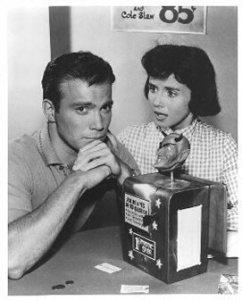
Ten: "Nick Of Time" (Season Two, Episode Seven)
A newlywed couple's car breaks down on their honeymoon, causing them to take a stop at a diner in the middle of no where while their car is fixed. The couple finds a little machine at a booth in the diner that, when you ask it any yes-or-no question, will always have the right answer, even if that answer involves events that haven't happened yet.
When people talk about William Shatner and his time on "The Twilight Zone" they immediately jump to the now-famous "Nightmare At 20,000 Feet." While that is certainly a good atmospheric episode where you're never too sure if the monster is really on the wing of the plane or if it's all in his head, "Nick Of Time" is a much more subdued outing that gives Shatner more range and emotion to work with.
Watching Shatner descend into madness as he keeps asking this toy question after question is both respectable and pitiful. He's wasting is life asking this thing questions about his future, but wouldn't you do the same thing?
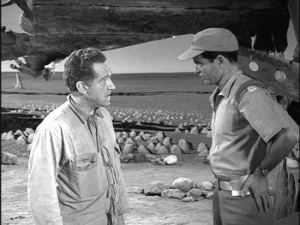
Nine: "On Thursday We Leave For Home" (Season Four, Episode Sixteen)
For thirty years, a small group of space explorers have been stranded on a desert planet. They've barely been able to survive on their remaining supplies, always living on the hope that rescue is just a day away. One day though, rescue does arrive, and the survivors are promised to return to lives that they have craved for decades. If only their captain did not want to see the last bit of his power and work fade away when they leave this planet.
Season four was hit-or-miss. It is half the length of any other season, but each episode is an hour-long, twice the length of a regular episode. This meant there are some scenes that are added on just to give it more run time, and that there are several episodes with pacing problems.
"On Thursday We Leave For Home" though does not have any of these problems and benefits from the hour-long length. This one is more of a character study, as we watch the captain lose everything that he had gained, as well as his sanity. He is willing to keep his entire crew on this dead hunk of a planet, just so that he can keep up his totalitarian will and power.
This one is a space tragedy, with some great acting from James Whitmore and Tim O'Connor.
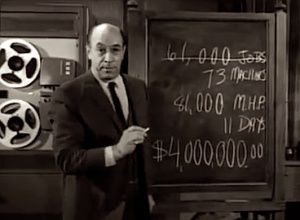
Eight: "The Brain Center At Whipple's" (Season Five, Episode Thirty-Three)
At a manufacturing company that has stood for integrity and excellence for decades, the new owner has decided to make some changes. Namely, replacing all expendable employees with computers to save on cost and maximize efficiency. It's too bad that the list of "expendable employees" just keeps growing.
"The Twilight Zone" had many episodes like this - the dangers of relying too much on technology and losing sight of our humanity. "The Brain Center At Whipple's" succeeds over all others because it makes a good case for why we need technology, while still showing just how ugly it is. The new owner points out that machines don't need to be paid, can't get sick, don't need food or sleep and won't take maternity leave.
Then every other character points out how this is still a terrible idea. I especially love the man who has worked at that company for over twenty years, in a drunken rage after being fired and replaced by a computer, yelling at the owner, "When you're dead and buried, who do you get to mourn for you?"
This man was only thinking, like a computer. Never feeling or understanding that there is more to business than making the product.
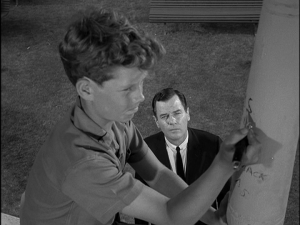
Seven: "Walking Distance" (Season One, Episode Five)
A young business man has his car repaired on the way back from a trip, only to realize that he is close to his boyhood town. He decides to take a walk in to town, only to realize that he has stepped back in time to when he was a kid. Eager to make his own life better, he sets out to find his younger self to tell him an important message.
This one makes the list for having a simple moral - No matter how hard we try, we cannot change the past. It is behind us, and there is no use looking back on it. Try looking ahead.
It is something we all do at some point. We all wish we could go back and tell our younger selves what our lives will be like and what changes they need to make to better our lives. "Walking Distance" asks, what is the point of dwelling on that anyway?
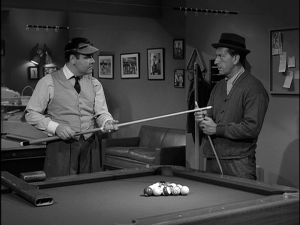
Six: "A Game Of Pool" (Season Three, Episode Five)
Jesse Cardiff is the best poolshark around. He could live with this if had ever played the greatest poolshark ever, James "Fats" Brown, if he were still alive. Well, one day Jesse gets his wish and Fats gives him a chance to prove who the best is. But, if Jesse wins, he might be in for a bit more than he expected.
This one is all about the dialogue between Jack Klugman and Jonathan Winters, two contrasting actors and performances. One is loud, boisterous and full of himself. The other is subdued, quiet and well-mannered.
There isn't much too this episode, as it is just two guys playing pool. Yet the dialogue is heavy, always weighing down on Jesse about the legacy of being "the best" and what it takes to get there. It not only makes you appreciate the best athletes, but also what they leave behind them.
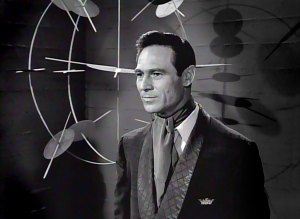
Five: "One More Pallbearer" (Season Three, Episode Seventeen)
This one is a strange, and I often find it to be the more underrated "Twilight Zone" episode.
Paul Radin is a man who can afford anything he wants and is a success in life in every meaning of the word. And he wants everyone to know that, especially the people who ruined his life. So, Paul constructs a massive atomic bomb shelter in the heart of New York City and invites three people from his past to join him there. Paul then intends to make it seem like an atomic bomb is about to drop on the city and the only way to save themselves is to admit they ruined Paul's life and that they're lucky to know him.
This one makes the list for being both tragic and uplifting at the same time. Paul believes these people ruined everything and made him miserable and deserve to be punished. But in reality, these three people did Paul a favor and he is just being an asshole of the highest order.
Like I said in the beginning, I won't spoil what happens, but let's just say that these three innocent people do the right thing and Paul is left more tragic than ever before.
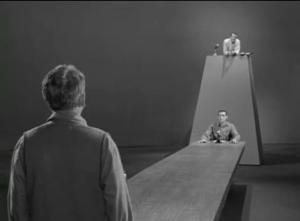
Four: "The Obsolete Man" (Season Two, Episode Twenty-Nine)
I feel it is better to let Rod Serling describe this one.
"You walk into this room at your own risk, because it leads to the future, not a future that will be but one that might be. This is not a new world, it is simply an extension of what began in the old one. It has patterned itself after every dictator who has ever planted the ripping imprint of a boot on the pages of history since the beginning of time. It has refinements, technological advances, and a more sophisticated approach to the destruction of human freedom. But like every one of the super-states that preceded it, it has one iron rule: logic is an enemy and truth is a menace. This is Mr. Romney Wordsworth, in his last forty-eight hours on Earth. He's a citizen of the State but will soon have to be eliminated, because he's built out of flesh and because he has a mind. Mr. Romney Wordsworth, who will draw his last breaths in The Twilight Zone."
This episode is, more or less, Rod Serlings' stance against dictators and totalitarianism. Where the single man becomes unnecessary, religion is nothing more than a farce and the public shares a collective brain.
Like the narration describes, this is a future that might have existed, and that is what makes this piece so strong. It doesn't point out one dictatorship in particular, instead talking about all of them. It is all capped off by a wonderfully uplifting performance by Burgess Meredith, a librarian who is no longer needed and must be killed, to show the need for the human soul.
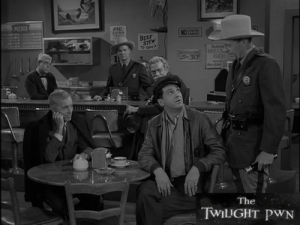
Three: "Will The Real Martian Please Stand Up?" (Season Two, Episode Twenty-Eight)
An alien spacecraft has just crashed in a massive snowstorm. The police find the wreckage, but no body. In a nearby café, they find a bus stopped and its passengers enjoying their meals. But when the police ask the bus driver how many passengers he had, they find that there is one more person in the café that was not on the bus. The question is, who isn't the human?
This one is a perfect mystery with an ingenious Twilight Zone set up. If the alien can copy a human appearance, how can you tell the difference? What questions do you ask an alien to tell that it is not from Earth? What if that alien has mental powers too and is influencing you whether you like it or not?
This one is just fun from start to finish. The diverse cast of characters, the mystery about who is the real alien, the comedy that comes from some of the crazier people in the café, the second guessing and the ultimate reveal and twist ending. Even after I've watched this one multiple times, I still get a kick out of it.
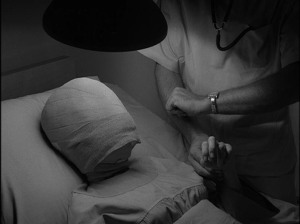
Two: "Eye Of The Beholder" (Season Two, Episode Six)
In a dark hospital room, a young woman lies with bandages covering her face, eager to take the bandages off and see the world again. It seems that she has had an operation to make herself look more normal, but this is the third time she's had this operation and if this fails the doctors can't do anything else.
Most people remember this one for the twist ending, which I do adore. But I will always remember "Eye Of The Beholder" for its amazing cinematography, lighting and camera work. Everything is shrouded in darkness, mystery and secrecy. We don't see the faces of any character until the episode is more than halfway done. Yet, we do not need to see any one's faces, because the emotions are still on full display through body and camera movement.
This is easily the most suspenseful and atmospheric episode of "The Twilight Zone" as we know there is something sinister going on with this woman, but we're never quite sure what.
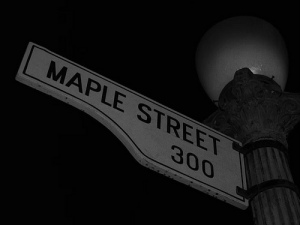
One: "The Monsters Are Due On Maple Street" (Season One, Episode Twenty-Two)
Maple Street, USA. Families are going about their daily routines, children are playing the streets, fun is being had. That is until all electronics stop working for some unexplained reason. The neighbors get together to try to figure out what's going on, and one of the children suggest that aliens might be the culprit. While initially laughed off, everyone else cannot come up with a better solution. This gets everyone riled up and thinking that the aliens might have sent out advanced parties to scout out the region, leading the once friendly neighbors to start pointing fingers at each other for suspicious behavior.
This one gets the number one spot because of how simple yet effective it is. The term "monster" is thrown around throughout the episode, but we're never entirely sure if it means the aliens, or our own fear and paranoia. We bring this upon ourselves by suspecting our friends and loved ones. This episode could take place at any time, and it would work just as well.
"The Monsters Are Due On Maple Street" is perfectly paced, relevant, and atmospheric. It encapsulates everything that I love about "The Twilight Zone," being both fantasy and reality while offering up a poignant statement on humanity. It never feels forced and is always exciting to watch.
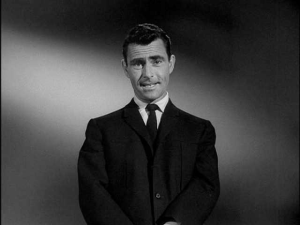
Here are a few honorable mentions:
"Time Enough At Last" (Season One, Episode Eight)
"Third From The Sun" (Season One, Episode Fourteen)
"People Are Alike All Over" (Season One, Episode Twenty-Five)
"A Nice Place To Visit" (Season One, Episode Twenty-Eight)
"The Night Of The Meek" (Season Two, Episode Eleven)
"The Little People" (Season Three, Episode Twenty-Eight)
"The Last Night Of A Jockey" (Season Five, Episode Five)

No comments:
Post a Comment